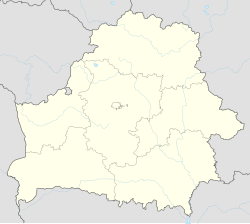Bruzgi
| |
|---|---|
Village | |
| Coordinates: 53°33′19″N 23°40′54″E / 53.55528°N 23.68167°E | |
| Country | Belarus |
| Region | Grodno Region |
| District | Grodno District |
| Time zone | UTC+3 ( MSK) |
| Area code | +375-15 |
|
| |
Bruzgi ( Russian: Брузги) or Bruzhi ( Belarusian: Брузгі) is a village in Grodno District, Grodno Region, in western Belarus. [1] It is part of Odelsk rural council ( selsoviet) and is located close to the border with Poland. The Kuźnica-Bruzgi border crossing is located near the village. Klachki and Trubka are two villages nearby.
History
According to the 1921 census, Bruzgi had a population of 151, entirely Polish by nationality and Catholic by confession. [2]
During World War II, Bruzgi was occupied by the Soviet Union from 1939 to 1941, then by Nazi Germany until 1944, and then re-occupied by the Soviet Union afterwards.
Between 1940 and 1959, the village served as the administrative center of Bruzgi rural council ( selsoviet). Until 2002, it was part of Padlabyennye rural council. [3]
21st century
In 2021, refugees, primarily Iraqi, entered the vicinity of Bruzgi, intending to depart from there to cross the Polish Border [4] at Kuźnica. [5] In response, the Polish government declared a state of emergency, stationing over 12,000 troops at the border. Politicians from Poland and the European Union accused Belarusian President Alexander Lukashenko of using the migrants as a form of " hybrid warfare" to destabilize Poland and other EU member countries. [6]
References
- ^ [Назвы населеных пунктаў Рэспублікі Беларусь: Гродзенская вобласць: нарматыўны даведнік / І. А. Гапоненка і інш.; пад рэд. В. П. Лемцюговай. — Мн.: Тэхналогія, 2004. — 469 с. ISBN 985-458-098-9 (DJVU).]
- ^ Skorowidz miejscowości Rzeczypospolitej Polskiej. Tom V (in Polish). Warszawa: Główny Urząd Statystyczny. 1924.
- ^ Решение Гродненского областного Совета депутатов от 20 сентября 2002 г. № 100 О решении вопросов административно-территориального устройства Гродненского района
- ^ "Belarus escorts 1,000 migrants towards Polish border". the Guardian. 8 November 2021. Retrieved 8 November 2021.
- ^ AFP, Mary Sibierski and Bernard Osser for (8 November 2021). "Migrants Massing at Border With Belarus Help, Poland Says". The Moscow Times. Retrieved 8 November 2021.
- ^ "Hundreds of migrants head toward Polish-Belarusian border". POLITICO. 8 November 2021. Retrieved 8 November 2021.
Bruzgi
| |
|---|---|
Village | |
| Coordinates: 53°33′19″N 23°40′54″E / 53.55528°N 23.68167°E | |
| Country | Belarus |
| Region | Grodno Region |
| District | Grodno District |
| Time zone | UTC+3 ( MSK) |
| Area code | +375-15 |
|
| |
Bruzgi ( Russian: Брузги) or Bruzhi ( Belarusian: Брузгі) is a village in Grodno District, Grodno Region, in western Belarus. [1] It is part of Odelsk rural council ( selsoviet) and is located close to the border with Poland. The Kuźnica-Bruzgi border crossing is located near the village. Klachki and Trubka are two villages nearby.
History
According to the 1921 census, Bruzgi had a population of 151, entirely Polish by nationality and Catholic by confession. [2]
During World War II, Bruzgi was occupied by the Soviet Union from 1939 to 1941, then by Nazi Germany until 1944, and then re-occupied by the Soviet Union afterwards.
Between 1940 and 1959, the village served as the administrative center of Bruzgi rural council ( selsoviet). Until 2002, it was part of Padlabyennye rural council. [3]
21st century
In 2021, refugees, primarily Iraqi, entered the vicinity of Bruzgi, intending to depart from there to cross the Polish Border [4] at Kuźnica. [5] In response, the Polish government declared a state of emergency, stationing over 12,000 troops at the border. Politicians from Poland and the European Union accused Belarusian President Alexander Lukashenko of using the migrants as a form of " hybrid warfare" to destabilize Poland and other EU member countries. [6]
References
- ^ [Назвы населеных пунктаў Рэспублікі Беларусь: Гродзенская вобласць: нарматыўны даведнік / І. А. Гапоненка і інш.; пад рэд. В. П. Лемцюговай. — Мн.: Тэхналогія, 2004. — 469 с. ISBN 985-458-098-9 (DJVU).]
- ^ Skorowidz miejscowości Rzeczypospolitej Polskiej. Tom V (in Polish). Warszawa: Główny Urząd Statystyczny. 1924.
- ^ Решение Гродненского областного Совета депутатов от 20 сентября 2002 г. № 100 О решении вопросов административно-территориального устройства Гродненского района
- ^ "Belarus escorts 1,000 migrants towards Polish border". the Guardian. 8 November 2021. Retrieved 8 November 2021.
- ^ AFP, Mary Sibierski and Bernard Osser for (8 November 2021). "Migrants Massing at Border With Belarus Help, Poland Says". The Moscow Times. Retrieved 8 November 2021.
- ^ "Hundreds of migrants head toward Polish-Belarusian border". POLITICO. 8 November 2021. Retrieved 8 November 2021.

